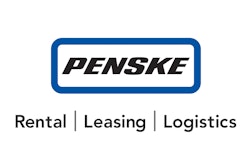PHILADELPHIA, PA
A newly released survey of third-party logistics providers shows that logistics companies experienced improved economic conditions in 2010, with 88 percent of companies surveyed in North America meeting or exceeding their revenue projections, as compared with only 50 percent in 2009.
The findings, contained in the 18th Annual Survey of Third-Party Logistics Providers, is underwritten by Penske Logistics, a leading provider of third-party logistics services.
The survey is being presented during the Council of Supply Chain Management Professionals Annual Global Conference, taking place October 2-5 in Philadelphia. Dr. Robert Lieb, Professor of Supply Chain Management at Northeastern University, the study's author, and Joe Gallick, Senior Vice President of Sales for Penske Logistics, are presenting the survey during the conference. The findings analyze responses from 36 third-party logistics company CEOs across North America, Europe and Asia-Pacific whose companies were responsible for generating approximately $58 billion in revenue in 2010.
Economic conditions appeared to slightly improve for third-party logistics companies surveyed in 2010 in North America. None of the companies were unprofitable and none of the CEOs believed the regional third-party logistics industry operated at a loss for the year. In Europe, economic conditions continued to be challenging for third-party logistics companies with only 55 percent of companies surveyed meeting or exceeding their revenue growth projections for the year, as opposed to 90 percent of companies surveyed in Asia-Pacific. Growth projections are most optimistic in Asia, with companies expecting to grow 15.8% in the next year, as compared to 10.8% expected in North America and 8.4% in Europe.
"CEOs continue to grapple with industry dynamics such as a stagnating economy, pricing pressures, rising costs and the impact of regulatory changes," commented Lieb. "These are similar to the trends we've been seeing in years past, and we are confident that the industry can adapt."
"This year's survey indicates the logistics industry has largely adjusted to the new economic realities and are now investing in growth," stated Gallick. "Companies are leaner and more adaptive than just a few years ago. Today, logistics companies are better positioned to help serve their customers as catalysts for supply chain transformation and innovation, which ultimately drives their own growth prospects."
European and APAC Results Both European and Asia-Pacific CEOs reported a shortage of managerial and operational talent in the industry as one of the major problems in their regions. In Europe, marketplace concerns about stability of the third-party logistics industry were also cited. The Asia-Pacific market is expanding, according to the survey findings, with CEOs seeing a variety of growth opportunities in the region, including increased volumes in China and India. The report also cited more extensive road transport services to support manufacturing in China as it moves inland. The most significant development in the APAC region for third-party logistics services during the past year was the diminishing role of Guangdong and Hong Kong as manufacturing centers, with manufacturing shifting to other low-cost countries and to China's Western Provinces. Demand for "all-in-one" supply chain services increased in 2010, as the industry in Asia-Pacific becomes more sophisticated.


















